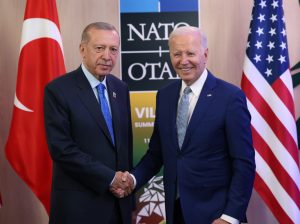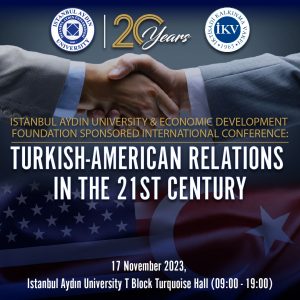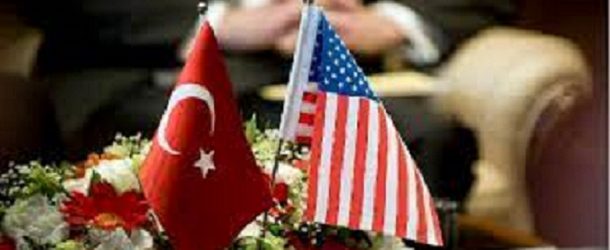Introduction
With the recent chaotic situation in Palestine, Turkish-American relations entered once again into a tense period with reciprocal accusations. The negative trend in bilateral relations started in 2016 with the fading of the Arab Spring’s democratization process and the failure of Western policy to topple Syrian President Bashar al-Assad by supporting the opposition groups. This policy had turned Türkiye into an unsafe country with millions of Syrian immigrants and various radical Islamic groups operating on Syrian soil freely. As a response to this mess, the Turkish Armed Forces (TAF) had to organize military incursions into Syrian territories to fight against radical terrorist groups such as ISIS (DEASH) and Al Qaeda. Moreover, Türkiye had to face a new reality in Syria: the strengthening of PKK-offshoot groups such as PYD, YPG, or SDF. Turkish leadership and people do not approve of the American support for pro-Kurdish groups that are involved in terrorist actions.
Another serious conflict in bilateral relations was caused by Turkish suspicions of the U.S. involvement in the 15 July 2016 coup attempt. The majority of people in Türkiye blame Washington for the failed coup attempt. Although there was a considerable decrease in anti-Americanism in the last two years, probably due to Türkiye’s economic problems, the current situation in Gaza poses another risk for the escalation of anti-Americanism. At this awkward moment, it might be a wiser decision to look ahead, rather than thinking of past mistakes.
Turkish-American Alliance should be reformatted
Turkish state elite still considers the U.S. as its most valuable partner and a good role model. Turkish people also do not have ideologically motivated hatred or prejudice toward the American way of life or U.S. politics and foreign policy in general. As a peace-seeking country following the founder of the Republic Mustafa Kemal Atatürk’s “Peace at home, peace in the world” principle, the Turkish political elite and people support peace, stability, democratization, and vibrant and developing economies in the region. The U.S. policies toward the region on the other hand are perceived as either bad-intentioned or poorly executed. For instance, the unconditional support by Washington to Israel is considered an effort to make the Middle Eastern region unsafe and full of chaos and troubles.
Moreover, as an independence-seeking country, somehow similar to French republican tradition, Türkiye wants relations on equal terms with the U.S. Washington on the other hand wants to see Ankara’s commitment to strategic partnership, NATO alliance, as well as democratic principles. It is a fact that estrangement from the U.S. has made the Turkish economy worse and Turkish democracy more limited and fragile. In the same vein, the U.S. and American allies in the region, without Turkish support, are more open to attacks coming from radical groups and fanatically anti-American states. Thus, both sides should work on a reformatted strategic relationship based on confidence and pragmatic solutions.

Erdoğan and Biden
First of all, the rapprochement process could start with increasing diplomatic and political visits. The U.S. Secretary of State Mr. Antony Blinken’s visit on November 5, 2023, could be the starting point of a new era if delicate diplomacy is conducted and necessary steps are taken. Turkish President Erdoğan might not be the most popular leader in the White House, but I think President Erdoğan should be received by President Biden soon to confirm both sides’ intention to improve relations. Erdoğan is a very pragmatic and ambitious leader who wants to consolidate his power and he is not anti-American at all. Similarly, a visit by President Biden to Ankara and Istanbul in 2024 might motivate Turkish decision-makers to give some concessions and open a new and blank page in Turkish-American relations. Since Turkish people are very emotional and warm, an intimate diplomacy could be efficient as in the case of historical Clinton and Obama visits.
Secondly, both sides could specify and declare clear redlines and certain principles to improve their relations. For instance, Türkiye could assure the U.S. that its ties with Moscow and Beijing are never developed at the expense of strategic partnership with Washington, and reciprocally the U.S. should guarantee that it would not support a PKK-led Kurdish state in Syria or Iraq. Knowing the borders and redlines, the foreign policies of both countries could be better arranged without stepping on the other side’s foot.
Thirdly, relations could be improved not only in strategic/military issues, but also in the economic, cultural, and social aspects. For instance, the U.S. could set up a new academic cooperation program for Türkiye and other Turkic states (Azerbaijan, Uzbekistan, Kazakhstan, Kyrgyzstan, Turkmenistan, and the TRNC) to improve academics and students’ mobility. Türkiye has been so far able to keep its ties with Europe mostly thanks to the Erasmus program and academic cooperation despite serious political/diplomatic polemics with European countries. So, this academic cooperation and increased trade volumes in many sectors could make the foundation of the bilateral relations even stronger. Likewise, why the U.S. does not think of setting up a joint university in Istanbul or Ankara similar to Galatasaray University etc.?

A new international conference on Turkish-American relations
Fourthly, relations should be analyzed constructively to solve problems. Both sides can learn a lot from each other as the U.S. hosts the world’s best universities and Turkish academics show extraordinary successes in many branches and know the region better than most American scholars. Think tanks, universities, and scholars from both countries could work on these issues seriously and more professionally to boost bilateral relations in all aspects. A new international conference and roundtable talk to be organized at Istanbul Aydın University on November 17-18, 2023 (https://turkamerikaniliskilerikonferansi.aydin.edu.tr/en/home-english/) could be an exemplary event in which academics would try to improve relations and show the right path to diplomats and decision-makers.
Conclusion
To conclude, there is a fine idiom in the Turkish language, which might give us a more optimistic mood: “The darkest moment of the night is just before dawn”. In terms of Turkish-American relations, we have the seen bottom and it is now the right time for a new rise.
Assoc. Prof. Ozan ÖRMECİ

























































